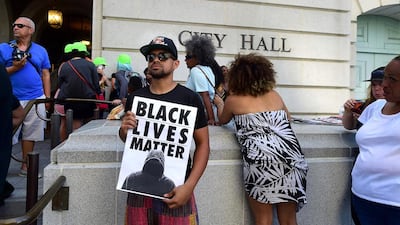Earlier this month, Emirati citizen Ahmed Al Menhali was scuffled down by police in Ohio after a hotel clerk tipped them off that she thought he was an ISIL operative. Dressed in traditional clothing, Mr Al Menhali said that the officers were brutal, forcing him to lay down on the floor and resulting in bruising and bleeding.
The UAE authorities rightly summoned the US embassy to explain the incident, expressing that the safety of its citizens is paramount. The result has been an apology and investigation.
It was simply the way that Mr Al Menhali looked that prompted the white American hotel clerk to assume he was a threat. Thankfully, the matter was resolved.
But for black Americans, the same incident could well have resulted in death. In fact, over the last few weeks it has. Just ask Philando Castile or Alton Sterling. Except you can’t, because they were shot by police.
What our Emirati citizen experienced is the daily reality for black people in America. The difference is that while an Arab can get rid of his or her traditional dress when in America, black people are targeted on the basis of something they cannot change or disguise, the colour of their skin.
This is what the Black Lives Matter movement seeks to highlight and combat. It addresses racism as a system of oppression based on race. This system manifests itself in institutional violence against black people in America. You see it in the way they are stopped and interrogated, in the higher rates of conviction, in the lower college rates, the lower rates of employment and pay, in the lower levels of representation.
The racist structures and those who enjoy white privilege don’t like BLM at all. They are fighting it at every turn. Take the emergence of “All Lives Matter” as a counter to “Black Lives Matter”. It critiques BLM for highlighting black people’s suffering. But this is the crux of it – black people do suffer disproportionately. Black people suffer specifically for being black. To shout over the BLM movement that actually all lives matter is itself a form of racism, privileging the suffering of non-blacks over black people by denying black people the right to express their outrage, anger and clear facts of the disproportionate discrimination they face. Because they are black.
Supporters of “All Lives Matter” don’t like the anger of black people. They don’t like the highlighting of black oppression and don’t want us to think there is an inherent problem in the structure of society that marks black lives as having less value. They don’t want to give up white privilege.
This is hugely ironic given that barely two months ago, the US couldn’t heap enough praise on Muhammad Ali after he died. He was hailed as a hero, someone who stood up for his beliefs. White America claimed his success, as though by embracing him the structures of racism would magically melt away. He is hailed as a conscientious objector to the Vietnam War, but would he have been sent to jail at the peak of his success had he not been black?
When asked why he was risking incarceration he replied: “I have nothing to lose by standing up for my beliefs. So I’ll go to jail. We’ve been in jail for 400 years.” Fifty years on, the Black Lives Matter movement continues his work to break out of the jail that is racism.
Shelina Zahra Janmohamed is the author of Love in a Headscarf

